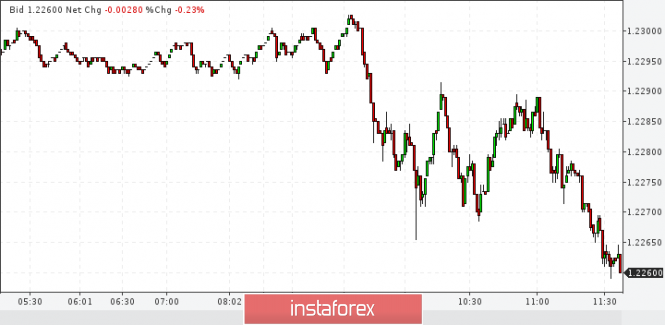
Britain's withdrawal from the European Union without an agreement will not do without negative consequences, experts never tire of repeating. The implementation of such a scenario will primarily hit the British currency, which will become a kind of "plasticine" during the "hard" Brexit. In this regard, analysts fear a total collapse of the pound.
In the past few months, the British currency has been under tremendous pressure. The reason for this is the political instability in the UK, which has become chronic. The debate over the country's exit from the EU does not subside, but does not bring tangible results. It is almost impossible to get out of this situation without losses for the British economy and the pound, analysts say.
Analysts believe that this week will be the key for the GBP/USD pair. Currently, the pair is trading within 1.2269–1.2272. The pair fell to 1.2260 in the moment. The dynamics of the pound is actively influenced by the restrictions put forward by Brussels for London. Recall, the EU leadership has set a deadline for the United Kingdom on October 11, so that the British authorities provide new conditions for the deal. The previous scenario with the provision of Northern Ireland the right to choose customs regulations between the EU or the UK in the event that the euro bloc refused control at the border was considered unacceptable. Brussels believes that this undermines the foundations of a single European market. Analysts are certain that UK Prime Minister Boris Johnson's team has no other options, and no breakthrough should be expected by the end of the week.
Currently, the British currency is becoming cheaper not only against the US dollar, but also against the yen. Both currency pairs, GBP/USD and USD/JPY, are suitable for opening short positions, analysts said. They pay attention to the formation of the "third wave" pattern in relation to the pair with the pound and advise them to sell when the bar falls below 1.2273. It seems this moment has come.

If the UK leaves the eurozone without a deal, the Bank of England will take the brunt. Representatives of the regulator argue that it is ready for such a turn. However, not all experts share this optimism, believing that exit without an adaptation period will lead to disastrous consequences for the economy. It will require a large-scale operational reaction of the authorities, whose potential is limited.
Analysts offer two options for the possible actions of the British regulator in the event of withdrawal from the EU without an agreement:
1) "Hard" Brexit until October 31, 2019. Management of the Bank of England, led by Mark Carney, claims to be ready to eliminate economic and financial turmoil in the implementation of this scenario. Analysts say that in this case, the regulator has a backup plan. At the same time, the Bank of England notes that they are unlikely to be able to restrain market unrest. According to M. Carney, the main thing is to prevent problems in the financial system so that the situation does not worsen. If the markets are in a state of free fall, the head of the regulator can convince investors of their willingness to provide liquidity if necessary. At the next meeting, scheduled for November 7, 2019, M. Carney may consider the adoption of additional incentive measures.
2) Brexit without a deal on October 31, 2019. If the UK leaves the EU within the planned time period, problems cannot be avoided either, analysts said. Despite the fact that the British regulator is ready for any manifestations of a liquidity crisis, it may be powerless in the face of a wave of volatility that will overwhelm the markets. Such a development of events is not excluded, especially if market participants hope to the last that one of the parties will make concessions. Many economists are certain that Brexit without an agreement will be accompanied by a softening of monetary policy, even if inflation exceeds the 2% target level. According to forecasts of Bloomberg Economics analysts who declare withdrawal without a deal in January 2020, the regulator will reduce the key rate by 70 basis points (bp) to 0.05%.
The first "victim" of the chaotic Brexit will be the British currency. The pound will be dealt a sensitive blow, economists are certain. If the country leaves the EU without a deal, sterling will drop to an extremely low $1.1100 from current levels of $1.2277–1.2280. At the same time, analysts believe that regardless of the extent of the national currency devaluation, the Bank of England will not conduct direct interventions. Last month, M. Carney said that the likelihood of such measures is extremely small. This is only possible in the event of a complete collapse in the financial market, but currency experts and politicians hope for the best.
The material has been provided by InstaForex Company - www.instaforex.com